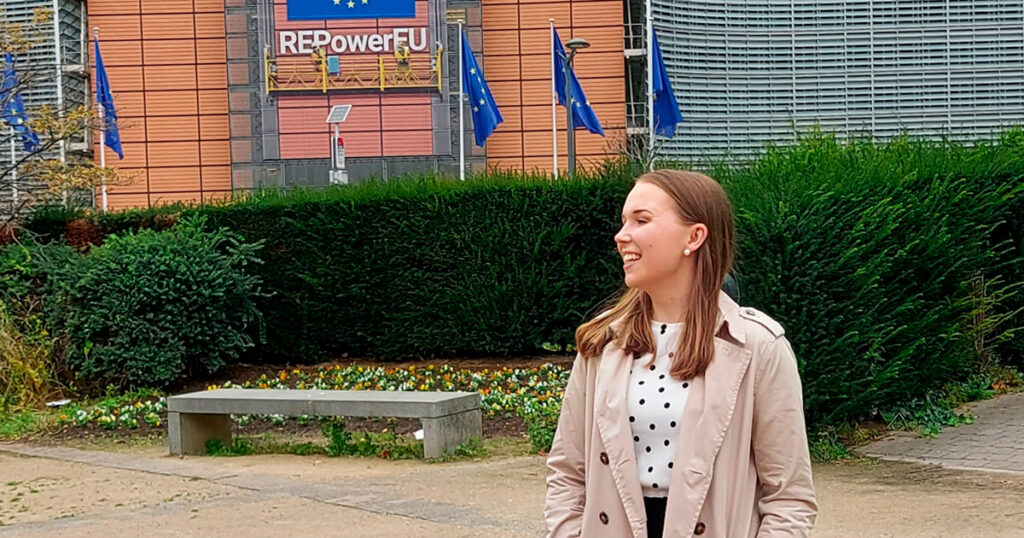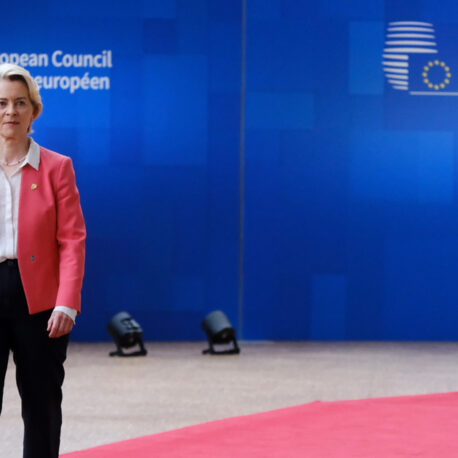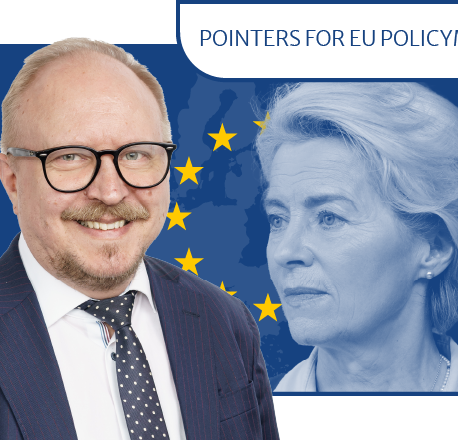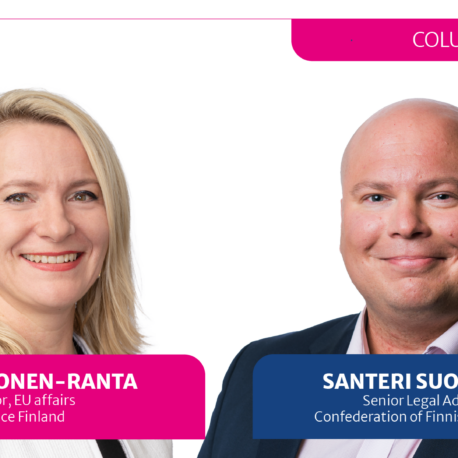
- The dwindling number of Finnish EU officials is causing concern. Finland is meeting its staff nationality quotas for high-level officials, but the number of junior officials is smaller than ever. This is a worrying development.
- The Finnish government programme seeks to support Finnish officials’ entry into and advancement in EU positions.
- Finance Finland considers it important that Finland has a good representation in EU organisations.
“Maybe I have an eye for spotting Finns, or I somehow just gravitate towards my fellow nationals, but in my experience, we still have a relatively large presence compared to Swedes and Danes, for example”, says Aurora Idänpää when asked about the number of Finnish EU officials.
Idänpää is currently working as a legal and policy assistant in the Gender Equality Unit of the European Commission’s Justice and Consumers Department. The role of the unit is to coordinate and monitor the implementation of the EU Gender Equality Strategy.
A lawyer by training, Idänpää is already on her second tour in the EU capital at the age of 26. Before starting as a legal advisor at Finance Finland, Idänpää was a trainee in the Commission’s Blue Book programme. During the traineeship, she took part in a recruitment competition and applied for a temporary position in the Commission. When she finally got the call announcing that she had received the position, more than six months had passed from the start of the process. In the meantime, Idänpää had already moved to Helsinki, taken up a position as a financial sector lobbyist and laid out the pieces for a more permanent life in Finland.
“It takes quite a while to receive the results from a recruitment competition and the selection process itself. The competitions are long: with full-time positions, the process can last more than a year, and six months is not exceptional even for shorter vacancies. This can feel like half a lifetime for many younger applicants, and it is understandable that people will continue on with their lives while waiting for the results”, says Idänpää. The EU institutions are currently working on a reform of the recruitment process, one of the aims being shorter selection times.
Idänpää eventually found a workable solution. She applied for a leave of absence from her new employer and returned to the Commission, where she is now promoting European-level work for gender equality.
Finnish officials need to step up their game
At Finance Finland, the concern that careers in the EU may be losing their appeal for younger generations is well recognised. The population-based EU staff nationality quotas were set for a good reason. Each official has a different perspective due to their unique experience and competence, and acknowledging national specificities no doubt improves the balance of decision-making in Brussels. The same goes for lobbying.
“From the lobbyist viewpoint, there are unquestionable benefits to having Finnish EU officials present in the many different sectors and levels of the system. Of course, officials work to influence policy and find solutions regardless of their nationality, but it is easier for Finnish sector participants to be on the same wavelength with a counterparty who understands how the Finnish financial market and society work. Different EU countries can have widely diverse mortgage markets, for example, or utilise private insurance in very different ways”, says Finance Finland’s Director of EU Affairs Mari Pekonen-Ranta.
Pekonen-Ranta thinks Finland may have been too modest and perhaps even naïve when it comes to the representation of different nationalities and the equality and impartiality of EU officials. In truth, decisions will always be influenced by personal experience and knowledge.
“I would hope for Finnish officials to take a slightly bolder approach. The officials of big EU countries sometimes act in the best interest of their home state without even bothering to hide it. Finns should follow their example and step up their game”, says Pekonen-Ranta.
National organisations will also benefit from employees who have direct experience from EU institutions. They provide valuable insight into the way decisions are made in the EU and the most opportune places to influence them.
… but first we need the officials
In its government programme, the Finnish Government commits to halting the decrease in the number of EU officials, juniors in particular. Rising through the Commission hierarchy takes time. If junior level officials are low in number now, we cannot expect to see Finnish representatives in high positions in the future either.
“There is no age limit to EU traineeships. I’ve met trainees of many different ages who have made a career change and come here through a traineeship scheme.”
AURORA IDÄNPÄÄ, EU Official

Finance Finland’s Pekonen-Ranta finds the inclusion of this issue in the programme a good thing. Increasing EU awareness in Finland and encouraging and helping people to participate in recruitment competitions would increase the number of Finnish EU officials.
As an acting EU official, what does Idänpää think would be the best way to boost Finns’ interest in making a career in the EU? “There’s no simple catch-all solution. The traditional route of increasing awareness and targeting consistent marketing at young people might work best”, Idänpää says.
“Encouragement is also very important. I bet the threshold to work in a French-speaking environment such as Brussels is much higher for Finns than for those from France or the Benelux countries. Geographical distance is also a factor”, notes Idänpää. She recommends everyone interested in an EU career to seek out the traineeship programmes of the different EU institutions, such as the European Parliament’s Schuman traineeship. Idänpää points out that the programmes are not limited only to the young, but that they work well also for career changers who have already accumulated experience.
“Traineeships are vital for future employment in the EU, too. You get to know people and get first-hand information on job openings, even the hidden ones. A young entrant’s chances of finding employment in an EU institution are the highest right after finishing a traineeship. I encourage everyone interested in an EU career to also keep an eye out for open recruitment competitions on the website of EPSO, the European Personnel Selection Office.”
Still have questions?
|Contact our experts
Looking for more?
Other articles on the topic

Hooray for simplifying regulation! But obligations must be streamlined thoughtfully, without compromising environmental goals

Putting EU citizens’ savings to work – Commission seeks growth by promoting saving and investment

Finance Finland’s CEO Ahosniemi: The Commission makes grand declarations for better regulation but fails to back them up with concrete measures in its work programme

The EU needs to build a more favourable investment climate








